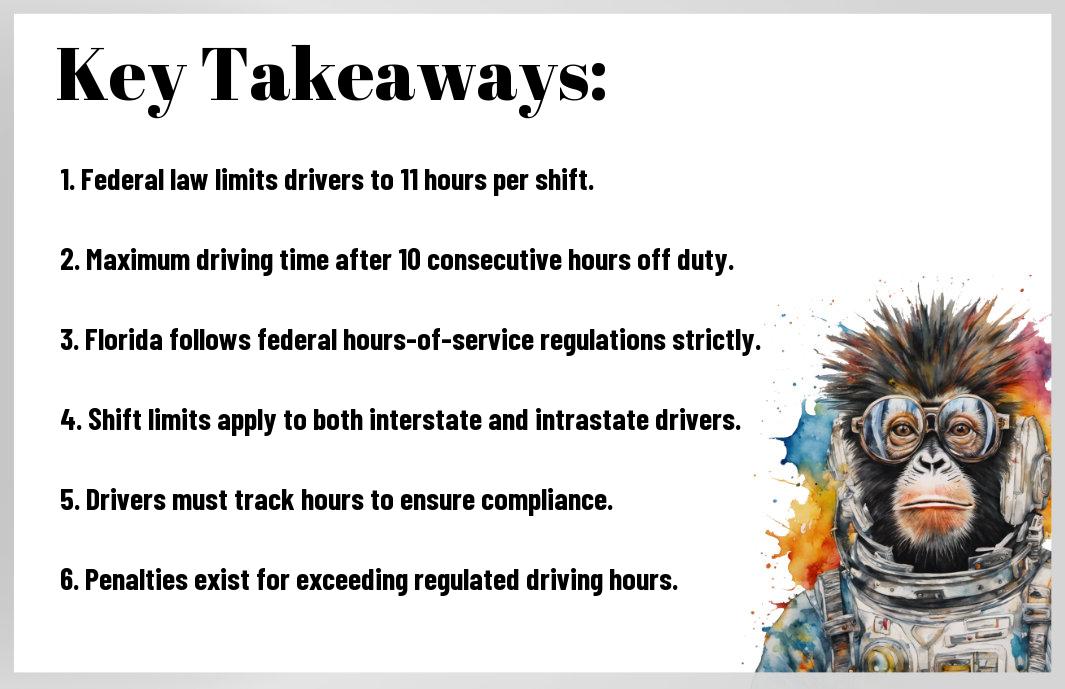Truck drivers in Florida face specific regulations regarding their working hours to ensure safety on the road. You must adhere to the Federal Motor Carrier Safety Administration (FMCSA) guidelines, which dictate that you can drive a maximum of 11 hours after 10 consecutive hours off duty. Additionally, you must not exceed a total of 14 hours of work including driving and non-driving tasks in a single shift. Understanding these limits is vital for maintaining your health, safety, and legal compliance while on the road.
Federal Regulations on Truck Driver Hours
While operating a commercial motor vehicle, truck drivers must comply with federal regulations set forth by the Federal Motor Carrier Safety Administration (FMCSA). These regulations are designed to ensure safety on the road and provide clear guidelines regarding the maximum number of hours you can work, rest requirements, and other related provisions that safeguard both drivers and the public.
Overview of the Hours of Service Rules
Across the United States, the Hours of Service (HOS) rules regulate how long you can drive and when you must take breaks. These rules aim to prevent fatigue and keep you alert while driving, ensuring that your time behind the wheel is safe for you and others on the road.
Limitations on Driving Hours
By following the HOS regulations, you can ensure that your driving hours remain within legal limits. Generally, you are allowed to drive a maximum of 11 hours after 10 consecutive hours of off-duty time, with additional rules governing how many hours can be logged in a 14-hour period.
Driver safety is paramount, and the HOS regulations provide a structured framework to avoid fatigue-related accidents. You must take a 30-minute break after driving for 8 cumulative hours, and after reaching the maximum driving limit, you must take a 10-hour off-duty period before resuming. Adhering to these guidelines not only protects your health but also enhances overall road safety.
Florida State Regulations
Assuming you are a truck driver in Florida, you are subject to both federal and state regulations regarding your work hours. Florida adheres to the Federal Motor Carrier Safety Administration (FMCSA) hours-of-service rules but may also implement additional state-specific regulations that can affect your driving limits. Understanding these regulations is imperative for maintaining compliance and ensuring your safety on the road.
Specific State Additions to Federal Rules
Below, you’ll find that Florida has not enacted any significant changes to the federal hours-of-service regulations. However, it is vital to stay informed as local enforcement practices and any pending legislation could potentially impact your driving hours and operational constraints.
Breaks and Rest Period Requirements
After a long drive, knowing when to take breaks is just as important as understanding your hours of service. Florida follows the FMCSA guidelines, which specify that you must take a 30-minute break after 8 consecutive hours of driving. This rule is in place to help you maintain alertness and reduce the risk of accidents caused by fatigue.
Further, adhering to these break and rest period requirements is vital for your well-being and productivity. You must have a minimum of 10 consecutive hours off duty before starting a new work shift. This ensures adequate rest, which significantly decreases the likelihood of driver fatigue-related incidents. Regular breaks not only promote your physical health but also enhance your overall performance on the road, enabling you to drive safely and effectively throughout your shift.
Special Considerations for Truck Drivers
Now, as a truck driver in Florida, it’s crucial to be aware of specific considerations that apply to your profession. These factors can impact your driving schedule and overall safety on the road. Understanding the regulations surrounding hours of service, along with any special circumstances that may arise, ensures that you maintain compliance and prioritize safety for yourself and others.
Exceptions for Emergency Situations
Beside standard regulations, there are unique exceptions for emergency situations that allow you to operate beyond typical hour limits. These circumstances often involve responding to natural disasters or urgent humanitarian needs. In such scenarios, you’ll need to be clear about the necessity and maintain a balance between your drive time and safety.
Implications of Violating Hours of Service
Beside risking penalties, violating hours of service regulations has serious implications for you as a truck driver. It can lead to hefty fines, loss of driving privileges, and potentially increase the risk of accidents due to fatigue. Adhering to these regulations not only keeps you safe but also enhances your reputation in the industry.
With each violation of hours of service regulations, you face significant fines and possible suspension of your commercial driving license. Such repercussions can hinder your ability to earn a livelihood and jeopardize your career longevity. Moreover, frequent violations may lead to increased scrutiny from authorities and potential legal actions, demonstrating that compliance isn’t just about following rules—it’s about safeguarding your future.
Impact of Hours on Safety and Health
Keep in mind that the number of hours you work can significantly affect your safety and health as a truck driver. Extended shifts can lead to impaired judgment, slower reaction times, and an increased likelihood of accidents. Balancing driving hours with adequate rest is vital not only for your well-being but also for the safety of everyone on the road.
Risks of Fatigue in Truck Driving
Before you hit the road, consider the risks associated with fatigue. When you operate a heavy vehicle while tired, your ability to focus diminishes, leading to higher chances of mistakes. Fatigued drivers are more prone to microsleeps, where you briefly fall asleep without realizing it, drastically increasing the risk of serious accidents.
Long-Term Health Effects of Extended Driving Hours
Against the backdrop of hours spent driving, the long-term health effects can be detrimental. Your risk for chronic conditions, including heart disease and obesity, escalates with extended hours on the road without proper breaks. Maintaining a consistent driving schedule with ample rest can help mitigate these risks.
Safety in your career as a truck driver extends beyond immediate road concerns; it also involves recognizing the long-term health risks associated with extended driving hours. Prolonged periods behind the wheel can lead to serious health issues, including sleep disorders and increased stress levels, which can ultimately affect your quality of life. Prioritizing breaks and adopting a healthy lifestyle can significantly improve your overall well-being, allowing you to perform your job more safely and effectively.
Industry Perspectives
All stakeholders in the trucking industry agree that understanding work hour regulations is vital for maintaining safety and efficiency on the roads. Truck drivers in Florida must comply with both federal and state regulations, which can influence their work schedules and overall quality of life. Insights from drivers and fleet managers alike can help navigate these regulations and create a more effective working environment.
Feedback from Truck Drivers
Behind the wheel, drivers share their attempts to balance long hours with the need for rest. They express concerns about potential fatigue affecting their performance, emphasizing the importance of adhering to the hours-of-service regulations. Many drivers advocate for better breaks and rest stops to recharge during their shifts.
Insights from Fleet Managers
Perspectives from fleet managers shed light on the operational challenges of maintaining compliance while ensuring productivity. They stress the importance of creating schedules that prioritize driver well-being, which in turn can lead to lower turnover rates and increased job satisfaction. Many fleet managers recognize that adhering to the hours-of-service rules not only keeps drivers safe but also protects the company’s reputation and reduces costly accidents.
But, managing a fleet entails more than just compliance; it involves fostering a culture of safety and communication. Fleet managers often implement training programs to ensure that drivers fully understand their limits and the technology at their disposal. With these practices, they aim to create an environment where drivers feel supported and valued, significantly reducing stress on the road and enhancing overall performance.
Resources for Truck Drivers in Florida
Many resources are available for truck drivers in Florida to help you stay informed and compliant with industry standards. You can tap into various organizations, websites, and training programs that cater specifically to your needs as a professional driver. These resources are designed to support you in navigating regulations, improving your skills, and enhancing your overall career in trucking.
Helpful Organizations and Websites
Before submerging into your driving career, exploring organizations and websites such as the Florida Trucking Association and the Federal Motor Carrier Safety Administration (FMCSA) can provide you with valuable information. These resources offer insights on regulations, safety tips, and industry updates, ensuring you stay informed and compliant.
Training and Compliance Resources
At the core of success in trucking are training and compliance resources tailored for your growth and safety. Various programs are specifically designed for you to hone your driving skills and understand the regulations pertinent to the industry. They cover critical topics such as road safety, vehicle maintenance, and hours of service regulations.
Plus, investing time in training and staying compliant with the laws can significantly enhance your driving career. Resources available include local driving schools and online platforms that offer certification programs focused on defensive driving techniques and hazardous materials handling. Engaging in these programs will not only bolster your expertise but also ensure you maintain a safe working environment while on the road.

Summing up
With these considerations, you should be aware that truck drivers in Florida can typically work a maximum of 11 hours within a 14-hour window after resting for at least 10 consecutive hours. Additionally, after reaching 60 driving hours in a 7-day period, you must take a 34-hour reset before resuming driving. Adhering to these regulations is important for your safety and compliance with federal and state laws, ensuring you can operate effectively and within the legal limits of your profession.








